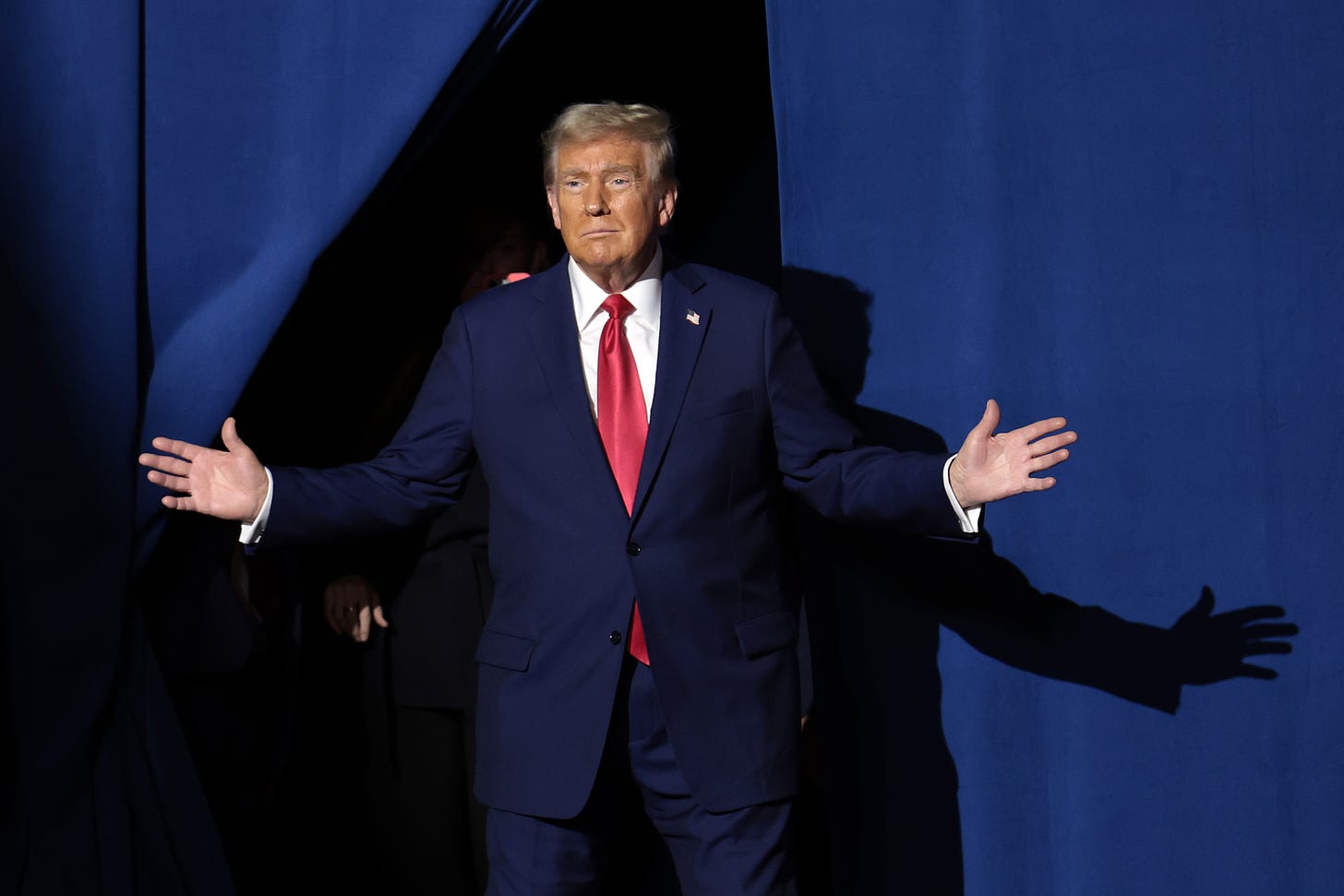
Don’t Buy The Trump Camp’s Spin
They are not destined to win. In fact, they’re laying the groundwork for a loss.

ON THURSDAY, THE TRUMP CAMPAIGN leaked a polling memo entitled, in their customary all-caps shout, “PRESIDENT TRUMP ON THE VERGE.”
To use language Team Trump would understand, this memo is bullshit masquerading as serious analysis. The race, as any neutral observer would agree, is tied, bouncing around inside the margin of error in almost every swing state. And, as we detail below, there is ample reason to believe that Vice President Harris can—and perhaps will—win.
Rather than being based in reality, the Trump campaign memo appears to be a transparent effort to drive a media narrative about the inevitability of a win. Why? Because if they lose, this chest-pounding confidence will provide a key element in their post-election claims that the race had been stolen.
Trump and many of his surrogates have said repeatedly that a Harris win is possible only if Democrats cheat. Trump is posting a sea of crap on Truth Social claiming completely made up nonsense about voting issues in Pennsylvania and elsewhere. This is all part of a coordinated, concerted operation. MAGA forces are flooding the zone with partisan polls; they are gaming the prediction markets. The memo, from Trump pollster Tony Fabrizio, is just another element of their preemptive plan to set up the Big Lie 2.0. Everyone in politics should be aware of what’s really taking place here.
Even a quick glance at the polls shows that the memo is not on the level. With four days to go, the candidates are neck-and-neck. Polls have shifted slightly toward Trump over the past two weeks, after Harris had caught up and moved a hair past him over the previous eight. The 538 polling average has four states within 1 point, six within 2 points, and the seventh (Arizona) within 2.5. Those are all inside the margin of error, meaning they are likely to be wrong, at least by a little. So, it’s simply not credible for anyone to be claiming victory at this stage. (There’s evidence the polls are herding, but that doesn’t tell us one way or another which outliers might be missing—it still just leaves us with a race that, as far as we know, is tied.)
While the polling tells us little, there are other factors that may give Harris the edge.
Democrats have a superior ground game: The Harris forces have a strong, organized, and enthusiastic get-out-the-vote effort run by professional staff and populated by motivated volunteers. Republicans have a shambolic operation run in part by a car/space/tech executive and staffed by paid canvassers. “Think Elon Musk Twitter, not Elon Musk SpaceX,” one high-level Democrat in Michigan told us. (It could be worse than that. Recent reporting suggests Musk’s canvassers could be facing fraud and coercion.)
In 2020, Trump had the better ground game, because Republicans ignored the pandemic and canvassed in-person, while Democrats did GOTV in their pajamas from their couches. This field asymmetry likely led to Trump overperforming the polls in 2020 (despite losing). The mismatch is in Harris’s favor this time, and in close races, field operations matter.
Democrats are more enthusiastic: According to Gallup, Democrats’ enthusiasm is ten points higher than Republicans’ and is higher than any time this millennium, including for Barack Obama’s campaign in 2008. This is an intangible metric, but it can help with turnout.
The early vote favors Democrats: Harris wins if turnout among women relative to men is higher than polling estimates. So far, it is. The usual caveats are necessary here. Early voting is a historically bad metric to judge and it is still way too early to reach any definitive conclusions from the current numbers.
That said, nearly 15.1 million have voted early in the seven swing states with 55-45 percent female to male breakdown. Thus far, nearly 1.5 million more women have voted than men in the swing states. This ten-point gender gap is certain to close, but it is evidence that women are more motivated to vote and that Democrats are doing a better job of getting their vote out. This election is expected to have the biggest gender gap in history, with women giving strong majorities to Harris and Trump winning men by double-digits. Not surprisingly, several recent polls have given Harris a huge lead (19 to 29 points) among people who have cast early votes.
Solid House swing seat polls: In 2016, in their own polling, competitive House campaigns picked up early warning signs of Hillary Clinton’s weakening position. Polling from seats like Minnesota 1st Congressional District (then represented by Tim Walz) showed Clinton underperforming House Dems in a way that called into question the public surveys showing her coasting to a win. By contrast, in this cycle, House polls in competitive seats do not show a slump in Harris numbers that would suggest overstatement of support.
Trump’s nastiness is breaking through: The overt racism of the Madison Square Garden rally and his recent misogynistic comment about protecting women “whether they like it or not” put Trump’s behavior in the spotlight. This is part of a long and deep pattern. Ultimately, Trump can win if voters’ gauzy memories of the pre-pandemic economy outweigh their angst over his cruelty and chaos. But Bad Trump has re-emerged at a helpful time for Harris. Indeed, her campaign says now that their data show them winning battleground voters “who have made up their minds in the last week.” The reason: The “Madison Square Garden stuff,” as a senior campaign official put it on a Friday call.
Diminished third-party threat: Because so many voters loathe him, Trump’s maximum vote share in four of the seven swing states didn’t surpass 48.8 percent over two elections. Even now, Trump is not polling above 48 percent in the FiveThirtyEight averages for Pennsylvania, Michigan, Wisconsin, and Nevada or above 49 percent in the rest of the swing states. Third-party candidates won roughly 6 percent of the vote in 2016 and just 2 percent in 2020. We will be closer to the 2020 level this cycle, since this time many of us have taken the threat of bleeding votes to fringe candidates head-on.
The GOP Electoral College advantage may be over: Hillary Clinton won the popular vote by 2.1 points but lost the Electoral College. The conventional wisdom that Democrats must win the national popular vote by at least 3 points may no longer be true. Trump is doing a little better in blue states he can’t win, like California and New York. That will end up boosting his national vote total while not helping his Electoral College math. The Harris team, meanwhile, is not expanding their efforts beyond the seven swing states, declining to invest in “wasted votes.”
The bottom line is simple. We don’t know who will win, and neither does either campaign. But we do know the snake oil confidence from Team Trump is deliberate, fanciful, and wrong. Indeed, Team Harris is entering this final countdown feeling hopeful, and that hope is well justified. No one in politics should enable MAGA’s efforts to set up the Big Lie 2.0 by letting them preemptively claim they have it in the bag. They don’t.
Matt Bennett and Jim Kessler are co-founders and executive vice presidents of Third Way, a center-left advocacy group.












